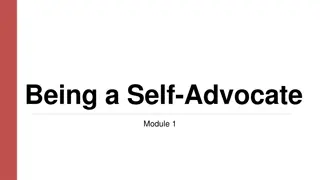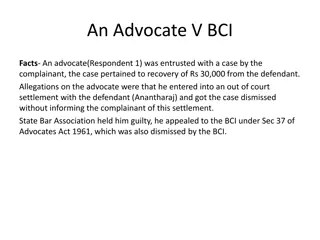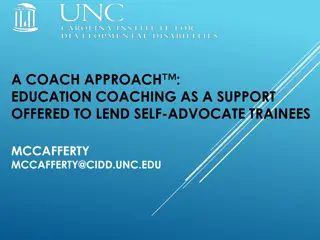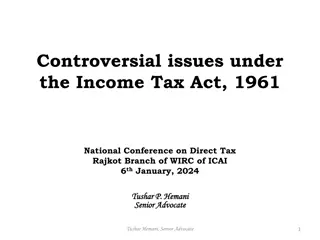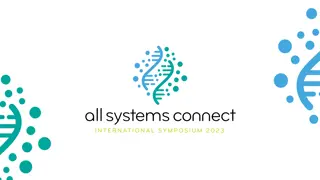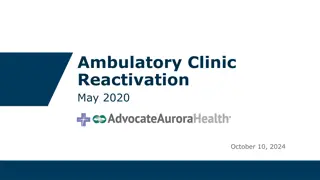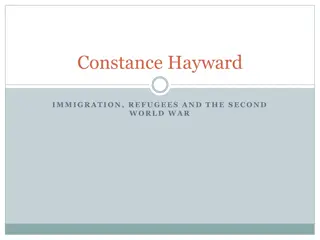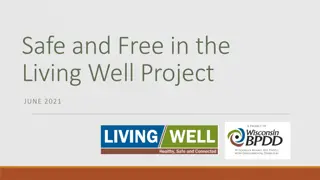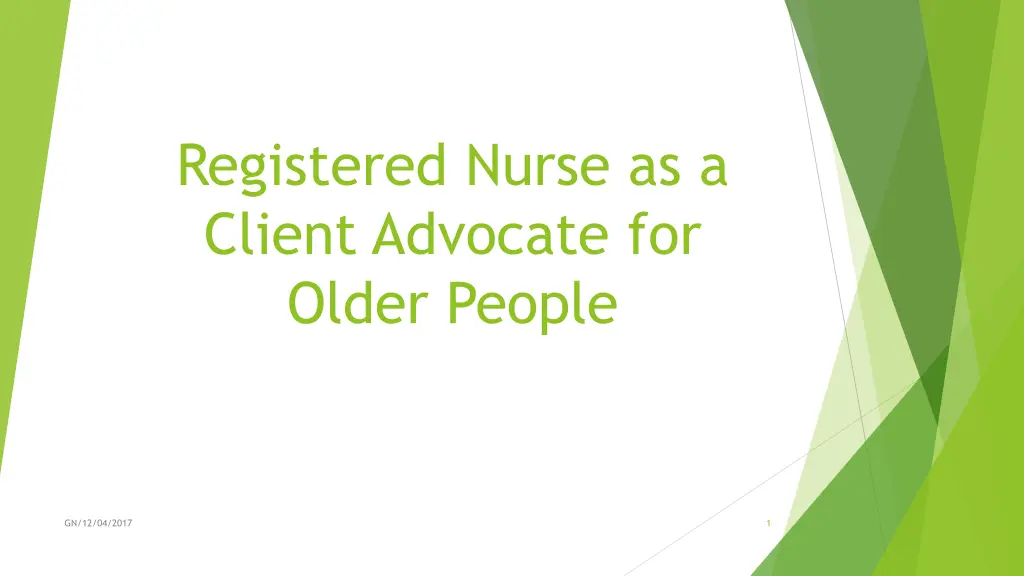
Empowering Older People Through Nursing Advocacy
Explore the role of a registered nurse as a client advocate for older people, emphasizing holistic care, community legal centers, and examples prompting contact with older people's rights services. Learn about the differences between social work and community nursing and the integration of nursing advocacy in professional standards.
Download Presentation

Please find below an Image/Link to download the presentation.
The content on the website is provided AS IS for your information and personal use only. It may not be sold, licensed, or shared on other websites without obtaining consent from the author. If you encounter any issues during the download, it is possible that the publisher has removed the file from their server.
You are allowed to download the files provided on this website for personal or commercial use, subject to the condition that they are used lawfully. All files are the property of their respective owners.
The content on the website is provided AS IS for your information and personal use only. It may not be sold, licensed, or shared on other websites without obtaining consent from the author.
E N D
Presentation Transcript
Registered Nurse as a Client Advocate for Older People GN/12/04/2017 1
Knowledge skills & experience UK & WA UK Experience Since 1990 I have worked in health care, starting as a care assistant in aged care whilst awaiting my Registered Nurse placement commencement. 1991-1994 Registered Nurse Training. 1994- 2002 Registered Nurse in primary, secondary and tertiary care: Accident & Emergency, Aged Care, Community Nursing, School Nurse, Head & Neck and ENT, Casual hospital work. 2002-2004 Nurse Advisor NHS Direct nurse advice line. 2004-2011 Continuing Health Care Co-ordinator & Dispute Resolution Co-ordinator ( community). WA Experience 2011-2012 Each & Each D community Care Package Co-ordinator. 2012- 2015 Aged Care Nursing. 2015- to date Older People s Rights Service. GN/12/04/2017 2
Community Legal Centres & a holistic approach Definition of Holistic Philosophy- Characterized by the belief that the parts of something are intimately interconnected and explicable only by reference to the whole. Medicine -Characterized by the treatment of the whole person, taking into account mental and social factors, rather than just the symptoms of a disease. ( Oxford English Dictionary, 2017) Older People s Rights Service believes that the legal difficulties older people are experiencing are intrinsic to their health and social circumstances. That failure to consider the whole leaves the older person vulnerable and at risk of abuse. GN/12/04/2017 3
Examples of why Older Peoples Rights Service is contacted The older person has experienced a loss of some sort and may or may not refer to it as abuse. I want someone to tell him/her, to write a letter, for them to change . Money missing, financial problems I cant believe they, he/she has done this to me . Relationship breakdown and loss of emotional support, health support, carer burnout. Suspicion of memory loss. Bereavement, or recent health scare- a need to get their affairs in order. Fear, validation a feeling of mistreatment or being disregarded it s like I m invisible or I ve already died . Response to education sessions and a desire to discuss matters. Return of adult children to the home and the problems they bring. GN/12/04/2017 4
How different is social work to community nursing? Social inclusion and justice/ access to services Older People Advocacy/empo werment/prom otion of independence Counselling/list ening and assessing Society and environment/ family relations/ health implications GN/12/04/2017 5
How does a nurse as an advocate fit in? Many national nursing organisations have integrated the role of patient advocate into their codes of ethics and standards of professional conduct for nurses (Bu and Jezewski 2007). Choi (2015) The Code: Professional Standards of Practice and Behaviour for Nurses and Midwives states that nurses in the UK must act as advocates for their patients, challenge poor practice and discriminatory attitudes and behaviour relating to the care of vulnerable people, help patients gain access to relevant health and social care, information and support, and engage them fully in decision making about their care (The Nursing and Midwifery Council (NMC) 2015) . Choi (2015) http://journals.rcni.com/doi/pdfplus/10.7748/ns.29.41.52.e9772 GN/12/04/2017 6
How does a nurse as an advocate fit in? Core attributes of patient advocacy (Baldwin 2003, Bu and Jezewski 2007). These are seen as: Safeguarding patient autonomy and promoting self-determination if patients are competent and willing to make decisions related to their health care. Acting on behalf of patients to protect their rights, values, benefits and wellbeing, if patients are unable or unwilling to represent or defend themselves. Serving as an intermediary between patients and their families or significant others, and healthcare providers. Championing social justice to ensure universal access to adequate nursing care and health care in institutions, and in the community or society . Choi 2015 http://journals.rcni.com/doi/pdfplus/10.7748/ns.29.41.52.e9772 GN/12/04/2017 7
How does a nurse as an advocate fit in? There are over approximately 458,000 seniors in Western Australia in a population of over 2.6 million almost 1/5th of the population. Most people live in the South West and Perth Metropolitan area. OPRS is located in Perth s Northern suburbs and services the Perth metropolitan area with a team of two, a solicitor and an advocate. If we then consider the health of the population it is the lucky minority who get to 80+ without any health or social issues. 10-15 % of adults over 65 experience depression and around 10 % have anxiety problems, this can rise to 35% if in a care environment (Beyond Blue 2017). Add in medication, carer responsibilities, bereavement and you begin to see a picture of the challenges for older people. We have older people supporting even older people and generations younger than themselves. GN/12/04/2017 8
How does a nurse as an advocate fit in? Many people who are the recipients of health and social care fit into the category of older people. Many older people are also recipients of complex care and will be known to different services such as OT, Physio, Speech Pathologist, Psychologist, Psychiatrist, Social Worker , GP and Specialist /Consultant, Pharmacist, Chronic Pain Teams, Community Nursing, Care Providers, Centrelink, Mental Health. Working with older people often involves working with complex issues that complicate any legal problems that the older person is experiencing. Understanding health conditions and the impact that they have on an individual, how they present, and being able to understand medical notes is often an aid to understanding the context of their legal problems. Eg a client with Parkinson s may present with tremors, facial masking, mobility issues. A delay in processing information and responding, they cannot be rushed, speech impairment, excessive saliva ( drooling) due to swallow problems associated with the condition. GN/12/04/2017 9
How does a nurse as an advocate fit in? Client interactions: Telephone conversations take anywhere from 15 to 30 plus minutes to get an understanding of the older person s issues. Can t be rushed If you want the whole story it is vital for the advocate to establish rapport and trust. A caring response and sympathetic ear will help older person open up. Older people often present as tearful, shocked about their situation and intimidated by the thought that they are being judged or assessed. Memory loss and embarrassment about admitting they have unconditionally trusted family member or friend and are hazy about recalling dates, times and names. It s rarely a quick process and a challenge for professionals involved. Too often the legal issue is complicated by health, emotional and social circumstances. GN/12/04/2017 10
How does a nurse as an advocate fit in? Health Impacts: Acute illness and infection affecting decision making. Opiate analgesia ( strong painkillers) and chronic conditions affect the time needed to process information. Physical problems can affect an older person s ability to complete documentation. Validation and recognition that someone understands the impact that their condition has on how they present not being dismissed as just an old person . Often the legal issue is of minor importance to the older person but of prime importance to someone else. GN/12/04/2017 11
How does a nurse as an advocate fit in? How do you navigate the world as an older person? Do I have EPA, EPG? I don t know who to trust. Who will care for me, what about an Advanced Health Directive? Who will advocate, I don t want to make a fuss, I don t want to lose my relationship with friend/family? Who will sort out my bills? Who will take me to appointments? Why can t I ever speak to a person? My spouse/sibling, friends are dying. My house is too big but I can t bear to move. What about my possessions? I don t know if I should drive anymore? Am I losing my memory, I m frightened by what is being said, who can I talk to? I just need someone to listen. GN/12/04/2017 12
How does a nurse as an advocate fit in? Keeping The Focus: Difficulty keeping older people focused, interruption causes problems. Identifying when medical and/or mental health support is needed. Pharmacological review indicated. Encouraging and supporting through difficult times, need to contact crisis service re boomerang child , mental health services, family services and that frequent calls are often needed before interventions can occur. Family members may spiral but assistance is provided yet, can be very difficult for older people to deal with. Psychological support - having depression, anxiety is not taboo and that the need to talk is a basic human need. As professionals we do it all the time, we use our peers as soundboards to reflect professionally and personally. Older people, particularly if isolated have little opportunity to do this. Knowledge of community service availability, difficulties experienced in communicating, hearing loss visual impairment, society set up for an IT literate population, lack of connection to people, touch tone phones with multiple options. GN/12/04/2017 13
Case Studies Mrs x admitted to care facility/ had previously been independent, and following OT assessment deemed to be unable to navigate external environment without supervision. Care manger challenged about repeat assessments once Mrs x sufficiently orientated to environment 4-6 weeks . Waiver signed and now gets about without incident. Administrator duties- spouse with dementia displaying verbal and physically challenging behaviours and non concordance with medication. Recognition by the carer that there are limits to their endurance and care provision- no one person can be a team. Self neglect, unrealistic expectations, lack of insight into own care needs Mr P has Dementia, presents well, functions in society but has opened numerous bank accounts and very suspicious of people. Exploration of prescription reveals taking medication for Alzheimer's and other health problems. Over medicating and suspicion of delirium requiring GP input. GN/12/04/2017 14
Challenges For The Older Person: Not wanting to be fobbed off as being old, dismissed for not getting to the point quickly, stumbling over facts, embarrassed about their situation, feeling a need to rationalise historical decision making, which in hindsight was poor. For The Nurse working as Advocate in a Legal Service: Legal practice rules and codes place restriction and limitations on how a nurse working as an advocate undertakes their role. Nurses work collaboratively with other professions, family members and other trusted people to provide healthcare. Often a stumbling block in an environment of privileged information. GN/12/04/2017 15
Conclusion Our client group can range from 50 to 90 plus years and as such it is likely that their health will be a contributing factor to safeguarding their wellbeing. It is the knowledge, skills and experience of the Advocate that benefits the client not necessarily whether they are a Social Worker or Nurse. Our clients will lie somewhere on the spectrum of social care to health. Nurses as advocates are well aware that dependence and lack of confidence increases with health problems. This can leave older people vulnerable and therefore at risk of abuse, they may no longer trust their own judgement. In addressing health and social issues it is hoped that by: Connecting with Older People s Rights Service any decline will be noted, social isolation addressed and trust built up to reduce risk of abuse. Advocating with other services, through knowledge of operational management of health, social care and other services, that older people can have a better experience and feel empowered to make decisions about their lives. GN/12/04/2017 16



